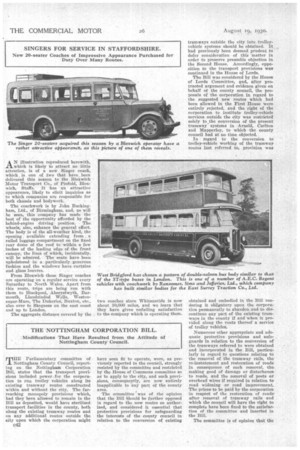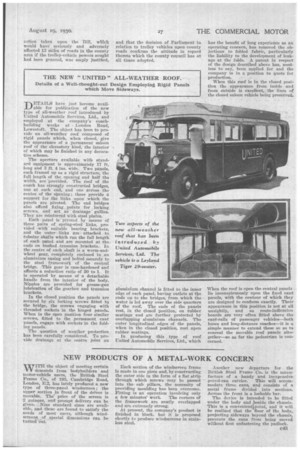THE NOTTINGHAM CORPORATION BILL.
Page 64

Page 65

If you've noticed an error in this article please click here to report it so we can fix it.
Modifications That Have Resulted from the Attitude of Nottingham County Council, MILE Parliamentary committee of 1 Nottingham County Council, reporting on the Nottingham Corporation Bill, states that the transport provisions included power for the corporation to run trolley vehicles along its existing tramway routes constructed within and without the city. The farreaching monopoly provisions which, had they been allowed to remain in the Bill as deposited, would have sterilized transport facilities in the county, both along the existing tramway routes and on any additional routes outside the city upon which the corporation might have seen fit to operate, were, as previously reported to the council, strongly resisted by the committee and restricted by the House of Commons committee NO as to apply to the city, and such proviSiOnS, consequently, are now entirely inapplicable to any part of the county area.
The committee was of the opinion that the Bill khoulcl be further opposed in regard to the new routes so authorized, and considered it essential that protective provisions for safeguarding the interests of the county council in relation to the conversion of existing tramways outside the city into trolleyvehicle systems should be obtained. It had previously been deemed prudent to defer consideration of this matter in order to preserve preamble abjection in the Second House. Accordingly, opposition to the transport provisions was continued in the House of Lords, The Bill was considered by the House of Lords Committee, and, after protracted argument and evidence given on behalf of the county council, the proposals of the corporation in regard to the suggested new routes which had been allowed in the First House were entirely rejected, and the right of the corporation to institute trolley-vehicle services outside the city was restricted solely to.the conversion of the present traraway systems in Arnold, Carlton and Mapperley, to which the county council had at no time objected.
In regard to the conversion to trolley-vehicle working of the tramway routes last referred to, provision was obtained and embodied in the Bill rendering it obligatory upon the corporation permanently to abandon and to discontinue any part of the existing tramways in the county if and when it provided along the route thereof a service of trolley vehicles.
Numerous other appropriate and adequate protective provisions and safeguards in relation to the conversion of he tramways referred to were obtained and incorporated in the Bill, particularly in regard to questions relating to the removal of the tramway rails, the re-instatement and restoration of roads in consequence of such removal. the making good of damage or disturbance to roads, and the removal of posts or overhead wires if required in relation to road widening or road improvement. The prices to be paid by the corporation in respect of the restoration of roads' after removal of tramway rails and which the council will have the right to complete have been fixed to the satisfaction of the committee and inserted in the Bill.
The committee is of opinion that the
action taken upon the BR wlileh would have seriously and adversely affected 13 miles of roads in the county area if the trolley-vehicle powers sought had been granted, was amply justified,
and that the decision of Parliament iii relation to trolley vehicles upon county roads confirms the attitude in regard thereto which the county council has at all times adopted.












































































































